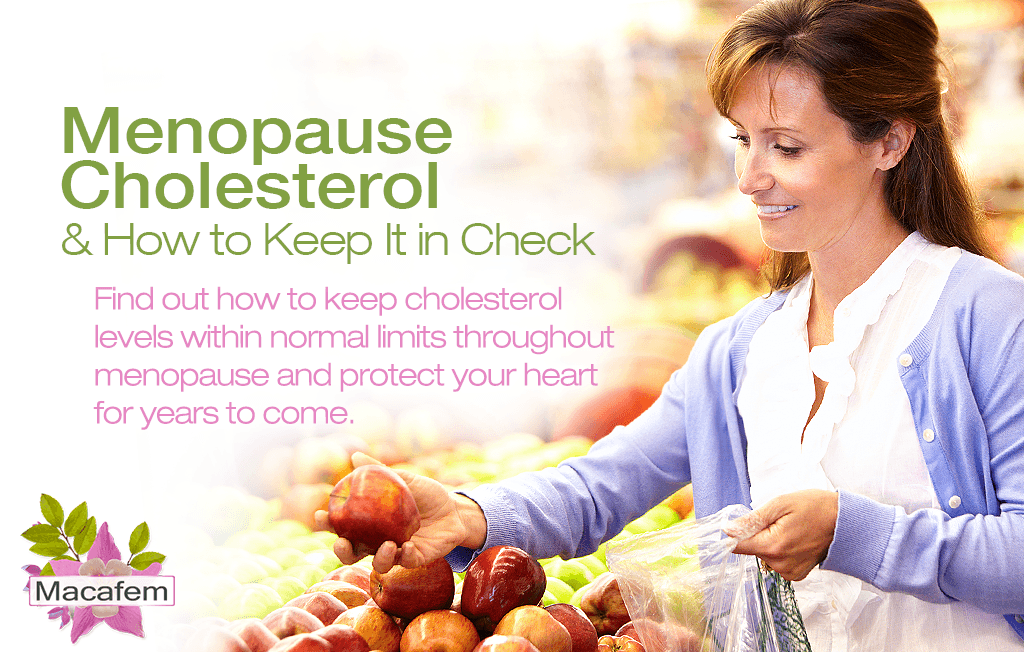Menopause Cholesterol: What It Is & How to Keep It in Check
One of the less noticeable but potentially serious effects of menopause is its impact on cholesterol levels. While cholesterol has gained a bad reputation, it actually serves multiple beneficial roles in the body. However, its excessive levels can put your menopausal health in jeopardy. Read on to learn all about cholesterol during menopause, what it means for your well-being, and easy ways to keep it controlled.

Cholesterol Overview
Cholesterol is a type of lipid found in the blood. Most cholesterol in the blood is made by the liver, with the remaining about 20% coming from food. Cholesterol is essential for many bodily functions, including making cell membranes, hormones, and vitamin D, among others.
Cholesterol is carried in the bloodstream on lipoproteins, with low-density lipoproteins (LDL) and high-density lipoproteins (HDL) being the two most common types.
LDL cholesterol is colloquially called “bad cholesterol” because its high amounts contribute to plaque buildup in the arteries, which increases the risk of heart problems. Likewise, HDL cholesterol is referred to as “good cholesterol” because it helps eliminate excess cholesterol from the bloodstream, thus promoting heart health.
How Menopause Affects Cholesterol Levels?
Studies have shown that menopause can affect cholesterol levels in several ways. One of the main reasons is the decline in estrogen, which has a protective effect on the heart and blood vessels. Estrogen helps lower LDL and raise HDL, as well as prevent inflammation and oxidative stress that can damage the arteries.
Cholesterol levels (specifically, total cholesterol and LDL) show a tendency to progressively increase during the menopausal transition, a time of women’s life during which estrogen levels dramatically fluctuate and eventually reach low levels. As a result, 65% of women 65 and over have elevated cholesterol in comparison to 48% of men in that same age range.
In addition, research suggests that there might be other factors besides estrogen levels that affect women’s cholesterol levels after menopause, including the levels of the anti-Müllerian hormone. Menopausal women also tend to gain weight and lead a more sedentary lifestyle, which can also contribute to an increase in their cholesterol levels.
Risks of High Cholesterol During Menopause
The changes in cholesterol levels during menopause can increase the risk of heart disease and stroke, especially for women who have other risk factors, such as high blood pressure, diabetes, obesity, smoking, or a family history of heart problems.
In fact, according to the American Heart Association, heart disease is the leading cause of death for women in the United States, and the risk increases after menopause.
Best Ways to Regulate Menopause Cholesterol
The good news is that there are many natural ways to manage cholesterol levels during menopause and reduce the risk of heart disease and stroke. Some of the most effective strategies include the following:
- Eating a healthy diet that is low in saturated and trans fats, cholesterol, salt, and added sugars, and high in fruits, vegetables, whole grains, lean proteins, and healthy fats has been shown to lower LDL and raise HDL, as well as improve other cardiovascular risk factors.
- Exercising regularly, with at least 150 minutes per week of moderate-intensity aerobic activity (such as brisk walking, cycling, or swimming) and two or more days per week of muscle-strengthening activity (such as lifting weights, doing yoga, or using resistance bands) can help lower LDL and raise HDL, as well as improve blood pressure, blood sugar, weight, and mood.
- Quitting smoking or avoiding exposure to secondhand smoke can lower LDL and increase HDL, as well as prevent damage to the lining of the arteries and decrease the risk of blood clots.
- Managing high cortisol levels may help lower cholesterol levels, improve mental and physical health, and prevent unhealthy behaviors, such as overeating and smoking.
- Balancing hormone levels naturally with Macafem can help lessen the effects of hormonal lows on the body and mind during menopause. By nourishing the endocrine system with hormone-regulating compounds, Macafem can help relieve a range of menopausal symptoms and improve quality of life.
- Taking medication to lower cholesterol levels and treat other co-related conditions that can affect the heart, such as high blood pressure, diabetes, or thyroid problems, may also be necessary. Some of the most common ones include statins, bile acid sequestrants, and fibrates, among others.
Menopause is a natural and inevitable stage of life that can affect cholesterol levels and increase the risk of heart disease and stroke. However, by adopting a healthy lifestyle and keeping up with regular checkups, you can keep your cholesterol levels in check and protect the heart during and long after menopause.
Drugs & Aging. (2002). Management of hypercholesterolaemia in postmenopausal women. Retrieved March 6, 2024, from https://pubmed.ncbi.nlm.nih.gov/12027776/
Harvard Health Publishing. (2020). Take control of rising cholesterol at menopause. Retrieved March 6, 2024, from https://www.health.harvard.edu/womens-health/take-control-of-rising-cholesterol-at-menopause
Journal of Clinical Lipidology. (2023). The independent associations of anti-Müllerian hormone and estradiol levels over the menopause transition with lipids/lipoproteins: The Study of Women's health Across the Nation. Retrieved March 6, 2024, from https://www.sciencedirect.com/science/article/abs/pii/S1933287422003269?dgcid=author
Journal of Clinical Medicine. (2023). Association between Menopause, Postmenopausal Hormone Therapy and Metabolic Syndrome. Retrieved March 6, 2024, from https://www.ncbi.nlm.nih.gov/pmc/articles/PMC10342857/
The Texas Heart Institute. (n.d.). Cholesterol and Women: Top 5 Myths Debunked. Retrieved March 6, 2024, from https://www.texasheart.org/heart-health/womens-heart-health/straight-talk-newsletter/cholesterol-and-women-top-5-myths-debunked/
US Cardiology Review. (2008). Menopause, Cholesterol and Cardiovascular Disease. Retrieved March 6, 2024, from https://www.uscjournal.com/articles/menopause-cholesterol-and-cardiovascular-disease-0
University of Pittsburgh. (n.d.). This hormone may be the missing ingredient too heart-healthy cholesterol levels for menopausal women. Retrieved March 6, 2024, from https://www.sph.pitt.edu/news/hormone-may-be-missing-ingredient-heart-healthy-cholesterol-levels-menopausal-women

